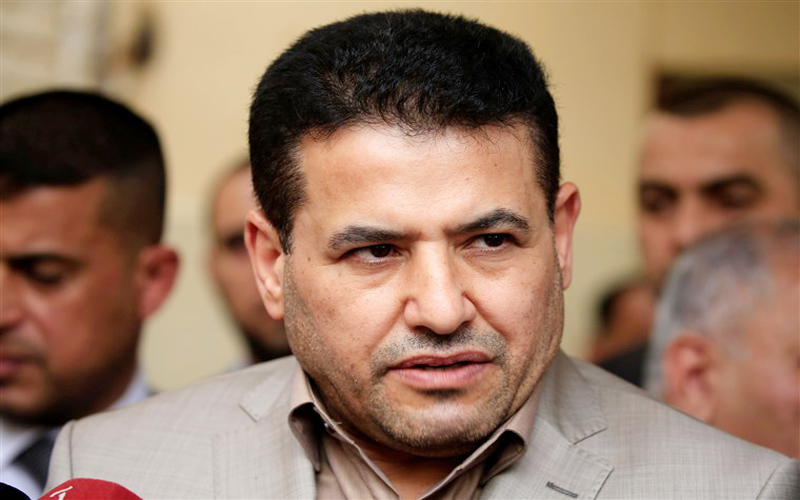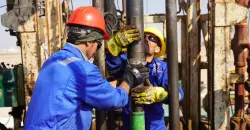Iraq's National Security Advisor stresses neutrality amid U.S.-Iran "obsession" in Iraq

Shafaq News/ Iraq's National Security Advisor, Qasim Al-Araji, affirmed the nation's stance to avoid becoming a battleground for conflicts between the United States and Iran, stressing that the fate of the 2,500 multi-national Coalition forces in the country will be determined by the Higher Military Commission (HMC) formed between Washington and Baghdad.
In an interview with Responsible Statecraft on March 1 on the sidelines of the Antalya Diplomacy Forum, Al-Araji discussed the major threats facing Iraq.
In the interview, the top Iraqi official discussed the major security challenges facing Iraq today.
"Since the defeat of Daesh (ISIS), narcotics are now the biggest challenge for us. The Interference of other countries is another threat to our stability. Iraq believes it should not interfere in the affairs of other countries and would expect the same from other countries."
He clarified the support of regional neighbors on issues such as ISIS and drug trafficking, stating that "Narcotics and drugs are a global challenge, so it needs regional and international cooperation, not only with our neighbors but with all the world. There is already some degree of cooperation, but I think we can do more as narcotics are a common threat to the stability and prosperity of all countries."
Asked how dire Daesh poses a threat and how prepared are the Iraqi forces to handle it alone, Al-Araji pointed out, "Our battle with Daesh is primarily an intelligence battle. The information we have is that Daesh does not have many fighters in Iraq, but we should cooperate with other partners in sharing intelligence and to fight and defeat the remaining Daesh fighters. We believe the main threat is the 10,000 Daesh foreign 10,000 from different countries in addition to those from Iraq and Syria."
He considered the remaining ISIS fighters in Iraq do not pose a significant threat to Iraq, "but they are still a threat. Iraq is capable of confronting Daesh by itself, but it needs to cooperate with others to dry up the financial support and other resources to Daesh. Last year we signed around 23 memorandums of understanding with our neighbors and other countries to deal with Daesh."
Al-Araji urged countries to repatriate their citizens from al-Hol camp, representing a "significant threat."
"We need to find a way to resolve the situation in al Hol, otherwise, it will keep providing extremists for Daesh. We urge countries to repatriate their citizens as there are almost 60 countries with citizens in al Hol. There are about 4,000 Iraqi families in this camp, and Iraq has repatriated about 1,924 families, but there are many more that must be repatriated."
On the Gaza file and how the war there is impacting Iraq, the Iraqi Advisor said, "The spillover from Gaza will impact Iraq and the whole region at the same time. The war crimes happening in Gaza will impact the stability of the whole region. Humanity is rejecting what is happening in Gaza right now. The policy of starvation, the policy of killing, and the policy of displacing people is affecting the whole world, and I am wondering why the international community is unable to stop this war. Nobody can stop the sympathy toward what is happening right now to the Palestinian people in Gaza. I think you know about the American Air Force airman who burned himself to death because of Gaza."
Concerning the role of "militias" in the national security structures in Iraq, Al-Araji made it clear that these factions "are not working against the government but supporting the current government. Some of them played a role in defeating Daesh in Iraq. Yes, there isn't a legal framework for their existence in Iraq. Our security institutions are very obvious, and the current government is doing its best to control the weapons that are outside of the government's control."
"These factions first formed during the occupation of the US troops in Iraq. Any country that feels it is occupied by another country would give rise to such resistance factions. After the withdrawal of American troops from Iraq in 2011, the country was stable with few major security problems."
"But when Daesh invaded and occupied over one third of our territory, these factions formed again to defeat Daesh. What is happening now in Gaza is an excuse for these factions to restart their activities, and that is embarrassing the government because the government is trying to do its best to prevent an escalation." He said.
Al-Araji affirmed that the Iraqi authorities is in communication with the Iraqi factions. "I am personally talking to these factions and if some of them are willing to join the Iraq Security Forces, we can work on that together. The stability of Iraq depends on all weapons being under control of the State and government."
Asked why it is so hard to capture and prosecute those responsible for the attacks on US forces, Al-Araji clarified, "There are very clear orders and instructions from the government to capture and prosecute anyone who is playing a role in attacking the Americans. Those who attacked the American embassy were captured and arrested. And some of those who also attacked American advisors in the Iraqi bases are being arrested as well."
On the US-led coalition presence in the country, the Iraqi top advisor mentioned that the Iraqi forces are capable of confronting Daesh and other security challenges, and the Global Coalition understands this.
"The relationships between Iraq and the global coalition are positive and we are looking forward to keeping these relationships friendly. We are friends and partners. They are here because we asked them to be here, and after 10 years, Iraq has the right to reassess the terms of this presence. There is an Iraqi-US Higher Coordinating Committee, and it will assess the presence of the Americans and the Coalition in Iraq."
"We are waiting for the result of these committees and depending on the reports we will take action. Iraq wants to establish separate bilateral relations with the members of the global coalition. It already has a bilateral agreement with the Americans, and we are looking forward to strengthening bilateral relations with other countries. We really want to have bilateral cooperation with the US and all the other members of the coalition." He added.
Regarding the US and Iranian influence in Iraq, Al-Araji pointed out that both sides are "obsessed" with the other's influence.
"The view of the Iraqi government is that we don't support either Iranian or American influence on Iraqi decision making. We have good relations with Iran and the US, but the conflict between both is negatively affecting Iraq. Hopefully Iraq will not be a proxy battlefield for them. I think restoring relations between the US and Iran will also help the relation between Iraq and the US and will affect Iraq positively overall."





